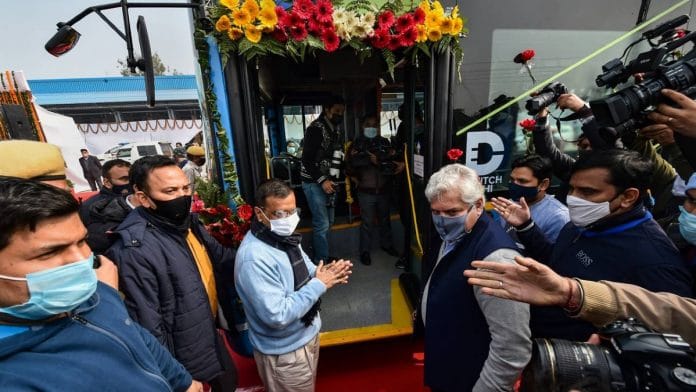New Delhi: An unelected candidate’s speech cannot be an official statement of intent about a future government’s budgetary plans, the Aam Aadmi Party (AAP) has told the Supreme Court in its suggestions about the proposed terms of reference for the expert body that will look into the issue of “freebies”.
Promises made during an electoral speech are a candidate’s or party’s broad ideological positions on various issues of citizens’ welfare — positions that allow citizens to make informed voting decisions, AAP said in its fresh written submission filed Tuesday. ThePrint has a copy of the submission.
The party, which has officially defended so-called freebies in the Supreme Court, submitted that once an elected government is formed, then it can decide whether to modulate, accept, reject, or substitute various schemes proposed during elections.
This modulation is done to fit the needs of the electorate as well as the government’s budget, and after incorporating feedback received from the electorate and experts, it added.
A bench headed by Chief Justice of India N. V. Ramana is hearing a public interest litigation (PIL) filed by advocate Ashwini Kumar Upadhyay, who has sought a prohibition on “freebies”.
In the last hearing, the court refused to consider the idea of derecognising political parties who offer “freebies”. However, it observed that “freebies” are different from welfare schemes instituted by governments.
The next hearing will take place on 17 August.
Also Read: ‘Abused for welfare schemes’: How AAP is trying to fight BJP after Modi’s ‘revdi’ remark
‘Infringement of free speech’
While coming out in support of the PIL, the Union government has agreed with the court’s proposal to form an expert body to recommend guidelines against “freebies”.
Initiating a broad-based consultation process regarding the proposed panel, the bench had asked Upadhyay, the Union government and AAP to give their suggestions on the terms of reference for the committee.
AAP has already filed an application opposing Upadhyay’s PIL.
Electoral promises such as free water, electricity or public transport are not “freebies”, but examples of discharging the state’s constitutional responsibility to create a more equitable society, it said.
With regard to the proposed terms of reference for the expert body, the Arvind
Kejriwal-led party said the panel should be tasked with suggesting measures to control actual fiscal expenditure, and not regulate electoral speeches.
Restrictions on electoral speech, imposed by the executive or the judiciary, would be “unconstitutional” and also an “infringement of free speech”, it said, adding that such curtailment is not protected by exceptions under Article 19 (2) of the Constitution, which permits “reasonable restrictions” on free speech.
If concerns over fiscal deficits and responsibility are indeed the point of the proceedings, it said, then targeting and regulating electoral speech will amount to nothing more than a “wild goose chase”. This is because electoral promises are completely inappropriate “proxies for regulating actual fiscal outgo”, it added.
To address issues of fiscal deficit by attacking electoral speech will hurt the “democratic quality of elections,” as it will prohibit parties from communicating their ideological stances on welfare, the party said. This, it added, will also not result in any progress towards achieving fiscal responsibility
In the interest of fiscal responsibility, AAP said, the panel should focus on the point of “actual outgo” of funds from the public exchequer, that is, budgetary actions of already elected governments and their fiscal planning processes.
(Edited by Tony Rai)
Also Read: Electricity or schools? Roads or hospitals? Why it isn’t easy for Modi to fix ‘freebies’






